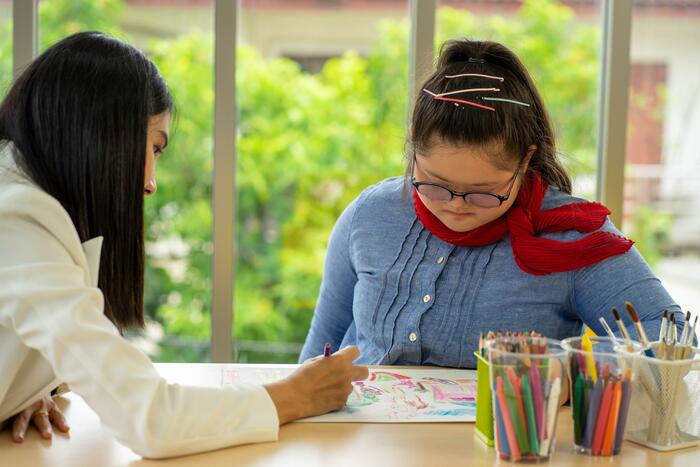Expert Sharpens Taarana Teachers’ Skills in Behaviour Management
“Static statements do not allow the child to think and act flexibly. Declarative statements encourage teachers to switch their communication styles.
While managing a mainstream classroom can be challenging, a special education class requires more significant commitments from teachers because of the variety of unique needs they address.
As special needs students present numerous distinctive behaviours, it is crucial to have multiple strategies to engage and manage their requirements.
Ideally, such teaching situations call for a behaviour specialist to provide support, training, consultation, and assessment to school teams and administrators in support of special education students with behavioural challenges. Often, this specialist will devise unique guides for teachers to understand their students’ behaviour and how to identify and resolve issues.
Taarana School is committed to providing its teaching and therapy staff with the most effective strategies for managing their special education students in the classroom setting.
The school has engaged a special education specialist, Dr Shyielathy Arumugam, to conduct behavioural management workshops to help its teachers oversee children with behaviour challenges.
Dr Shyielathy’s 15 years of field experience includes working with special needs children with conditions like Down Syndrome and Attention Deficit Hyperactivity Disorder (ADHD) at pre-school, primary, and secondary levels.
Her early childhood special education practice includes developing a web-based screening tool for mainstream teachers to identify students between the ages of three and four with developmental delays based on symptomatic behaviours.

Dr Shyielathy’s sessions thus far offer Taarana’s experienced educators deeper insight into the inner dynamics of special needs children to better manage behavioural challenges within their classrooms.
“A significant challenge special education teachers face is behaviour issues. However, there are several strategies that special needs teachers can employ to help with these situations,” she said.
Based on input from Taarana’s Principal, Dr Sunitha Sivakumaran, and her staff, Dr Shyielathy’s initial programme centred on equipping the teachers with behavioural management techniques applicable in the classroom through a direct approach. The online sessions also included breakout room activities. “Behaviour management will not work just by understanding the theories. It would help to practice getting good at it.
“We started with modules covering behaviour management understanding, positive and negative reinforcements, tools for a motivation assessment scale to understand why challenging behaviours occur, and a positive behaviour approach,” she explained.
Among other aspects, the modules provide the teachers with techniques to communicate with the children through verbal and non-verbal methods and practical sessions on how to hone their skills from static to declarative statements.
“Static statements are instructions that do not allow the child to think and act flexibly. On the other hand, declarative statements encourage teachers to switch their communication styles.”
Dr Shyielathy’s subsequent modules for Taarana will include observation assessments, individualised education plans, and entrepreneurship development for low-functioning students.
Tips for the Home Environment
For parents, it is essential to understand what triggers their child’s diverse and sometimes challenging behaviour. For example, children with special needs may exhibit more “difficult” behaviour because of their developmental disabilities, affecting their communication, understanding, or expression.
Understanding what triggers the issues and working around them at home is key to managing these challenges. The following basic tips can help you relate to your child’s behaviour management efforts in the classroom and address these challenges at home.
- Praise your child. “Your teacher shared that you are well behaved in school.” Such positive reinforcement can help lift your child’s spirit and encourage them to stay on good behaviour.
- Be patient but assertive. Lay clear rules and highlight the consequences of your child’s act-ups. For example, if they display tantrums in public, gently emphasise that they will not be allowed to participate in future outings if they continue such behaviour.
- Avoid confrontation. Calm your child down by engaging them in things they like to do, such as watching their favourite TV programmes.
- Get a little fresh air. If possible, take your child out for a walk to help them release their frustration and stress. Observe their behaviour and ensure they cool down before heading home.

